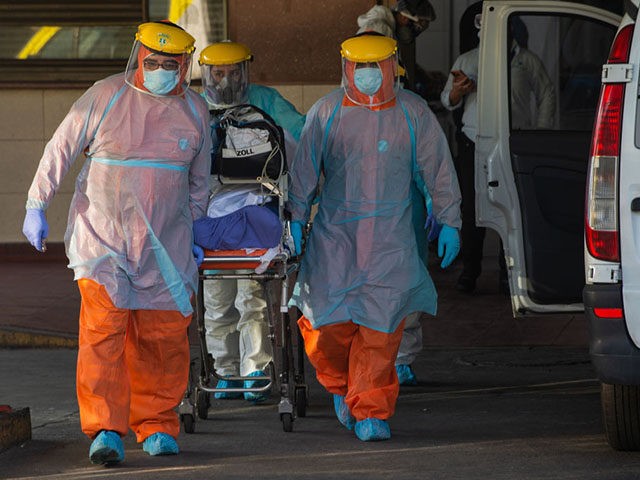The government of Chile defended its decision to trust Chinese vaccine products Sunday after its national vaccination program, one of the world’s most successful, preceded an exponential increase in confirmed coronavirus cases.
Chile’s Minister of Science, Technology, Knowledge, and Innovation Andres Couve heralded results from a study published Sunday showing the Chinese-made vaccine candidate currently at highest circulation in the country has little over 50-percent efficacy in preventing all coronavirus infections.
Couve referred to the study as “very encouraging,” referring to the product’s high rate of preventing hospitalizations, according to the Chinese government broadcaster CGTN.
“He said the mass vaccination in Chile is well underway, with more than 5 million people having received two doses. By the middle of this year, 15 million people will be inoculated,” CGTN reported.
Chile has received international acclaim for the speed at which it has inoculated its population. The high rates of vaccination corresponded, however, with high rates of infection, raising questions regarding how protected a general population using Chinese-made vaccines may consider itself. About 40 percent of Chileans have received at least one dose of any vaccine product available against Chinese coronavirus. The vast majority of them — 93 percent — have received doses of “Coronavac,” a vaccine product by the Chinese firm Sinovac Biotech.
In contrast, other nations praised for expansive vaccination programs have used American products. In Israel, about 80 percent of citizens have been vaccinated as of this weekend, most with American vaccines by firms Pfizer or Moderna. The program has resulted in such a dramatic decline in coronavirus cases in the country that the government rescinded its order mandating the use of sanitary masks outdoors Sunday.
Chile, a country of about 19 million people, has documented 1.12 million cases of coronavirus since the pandemic began and a little over 25,000 deaths as of Monday. Saturday was the third day in a row that the country documented over 7,000 new coronavirus cases in 24 hours, the most recent statistics available at press time, showing a slight increase from a dip into the 6,000s last week — that followed a surge to up to 9,000 cases a day in early April as the vaccine campaign accelerated.
Mass vaccinations began in Chile in February after the government of self-proclaimed “center-right” President Sebastián Piñera contracted with Chinese company Sinovac Biotech, which produces Coronavac, to import as many as 10 million doses of the product in January. Piñera, anticipating concerns over relying too closely on one vaccine, insisted that Chile was not “putting all its eggs in one basket” and also contracting with the American company Pfizer to import doses of that company’s vaccine. Piñera announced Chile had signed a deal for only 1.3 million Pfizer doses, however, meaning the vast majority of Chileans would receive the Sinovac product.
Chile has also approved vaccine products by the European company AstraZeneca and another Chinese company, Cansino, but neither have entered into widespread circulation at press time in the country.
The Pfizer vaccine, made in development with the European company BioNTech, has consistently tested at 95-percent efficacy in preventing Chinese coronavirus infections. It uses a novel technology in which mRNA, not the coronavirus cell itself, is used to trigger an immune response. Coronavac, a more traditional product, tested at only 50.38 percent efficacy in its Phase III trials.
A Chilean study published this weekend claimed Coronavac was 67 percent effective if not counting asymptomatic infections. After one dose of Coronavac, patients have an 84 percent chance of becoming infected, according to the study. The study found its efficacy rate against death at the hands of a coronavirus infection is 80 percent.
“Naturally, there is disappointment,” Chilean health official Rafael Araos told reporters on the results, according to Bloomberg. Araos stated that the scientists omitted legitimate but asymptomatic cases of coronavirus because including them “introduces more noise” into the study.
Araos predicted including the “noise” would bring Coronavac’s efficacy down to “54 percent or 55 percent,” about the results of the initial Phase III trials. A vaccine typically must pass a 50-percent efficacy threshold to receive approval from international drug oversight agencies.
Chilean authorities had already gone on the defensive regarding Sinovac prior to the release of the study last weekend.
“We keep trusting the Sinovac vaccine,” Chilean Health Minister Enrique Paris said last week. “The vaccine is 100-percent effective to prevent a patient from having to enter an intensive care facility and dying. It is 80 percent effective in moderate cases and up to 60 percent effective, according to another study, for mild cases that do not require medical treatment.”
Paris expressed “absolute calm” regarding the product, adding that “this vaccine is being used in many other countries, not just in Chile.”
Notably absent from the list of countries engaging in successful mass vaccination campaigns with Coronavac is China, its origin country and the home nation of the Chinese coronavirus. Widespread distrust of Chinese vaccine developers within China has led to such low vaccination rates that Communist Party officials have warned China may soon lag behind the rest of the world in developing herd immunity to the virus. The director of China’s Center of Disease Control (CDC) Gao Fu added to concerns regarding Chinese vaccines last week by announcing that products like Sinovac’s “don’t have very high protection rates” and Beijing should consider alternatives that use the mRNA technology found in the American products.

COMMENTS
Please let us know if you're having issues with commenting.